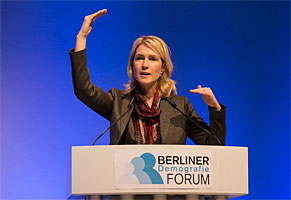“Policy discussions on demography up to now have addressed mainly the ageing of society. We must now increasingly move the focus to the younger generation, because it is especially about their future,” demanded Manuela Schwesig, German Federal Minister for Family Affairs, Senior Citizens, Women, and Youth, in her speech today at the third Berlin Demography Forum, taking place from April 9 to 11 at ESMT European School of Management and Technology. Together with Michael Diekmann, CEO of Allianz, Manuela Schwesig opened the cross-party, international platform for debate, which the ministry and the insurance company launched in 2012 to discuss important issues around demographic change.
In his speech Diekmann spoke of the need for more intelligent solutions to strengthen confidence in pension provision, such as the linking of the financing needs of infrastructure with investment options for retirement plans. “If we succeed in setting the correct course now, we will prepare our societies for the future: fostering innovation and economic growth, relieving the public finances, and ensuring the standard of living of our older citizens with attractive pension plans.”
Social solidarity for the long term – but how?
Under the motto “Security – Trust – Solidarity” at the Berlin Demography Forum this year more than 40 experts from government, academia, business, and civil society will examine the question of what kind of security people need in times of demographic change. They will discuss the ethical implications that must be considered today to ensure the long-term social solidarity that is being put to the test by an ageing population, and changing attitudes towards life.
For the first time representatives from the Protestant Church, the Vatican and from Business Ethics will discuss this ethical component. Representatives from the Central Council of Muslims and the Central Council of Jews in Germany will attend as well.
The “Young Experts Panel” supported by the Vodafone Foundation Germany will for the first time take the views of the younger generation into account. Dan He, Deputy Director-General of the Chinese National Health and Family Planning Commission will give a Government statement on International Demography policies and Dr. Günter Krings, Parliamentary State Secretary at the Ministry of the Interior speak about the German focus. The Berlin Panel, which includes Dr. Gregor Gysi, Chairperson of the parliamentary group Die Linke, Katrin Göring-Eckardt, Chairperson of the parliamentary group Bündnis 90 / Die Grünen, and Gisela Hasselfeldt, Chairperson of the CSU members of parliament in the CDU / CSU parliamentary group, will focus on German questions and answers. In addition this year, current research and poll results will be incorporated more strongly in the discussion.

